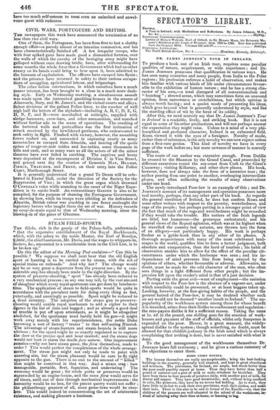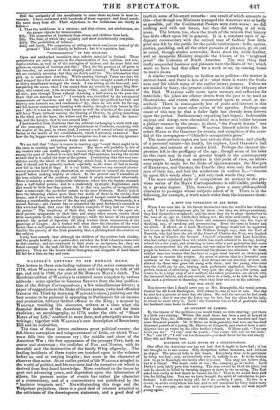SPECTATOR'S LIBRARY.
TRAVELS, A Tour in Ireland; with Meditations and Reflections. By James Johnson, &T.D.,
Fee. &c Highley.
EPISTOLARY CORRESPONDENCE,
Letters of Horace Walpole. Earl of Orford, to Sir llorace Mann, his Britannic Ma- jesty's Resident at the Court of Florence, from 1760 to 1785. Now first published from the Original MSS. Volumes III and IV Bentley. PERIODIC/J. LITERATURE,
The North British Review, No. I Hamilton; Kennedy, Edinburgh.
DR. JAMES JOHNSON'S TOUR IN IRELAND.
To produce a book out of an Irish tour, requires some peculiar qualities of nature, acquirement, or wide experience ; and Dr. JAMES JOHNSON possesses that qualification in various ways. He has seen many countries and many people, from India to the Polar regions ; his profession enforces a habit of observation, and makes him familiar with various kinds of life under circumstances favour- able to the exhibition of human nature and he has a strong cha- racter of his own,—a total disregard Of all conventionalism and " humbug " ; shrewd sense, which may sometimes form an unsound opinion, from narrowness or crotchetiness, but which opinion is always worth having ; and a quaint mode of presenting his ideas, which goes beyond what is generally understood by style, and gas the startling effect of wit by the force of its oddity. After this, we need scarcely say that Dr. JAMES JOHNSON'S Tour in Ireland is a readable lively, and striking book. But it is not equal to some of his other productions, and will not perhaps answer the expectation they might raise. Unless to a mind of a very phi- losophical and profound character, Ireland is an exhausted field. KOHL viewed it with the eyes of a foreigner. Novelty of mode, rather than of substance, is the only novelty we can now expect unless from a first-rate genius. This kind of novelty we have in every page of the work before us; but mere newness of manner is scarcely sufficient.
The route of our author was extensive enough. From Dublin he crossed to the Shannon by the Grand Canal, and proceeded by different excursions round the sea-coast from Cork to the Giant's Causeway ; visiting Killarney, and other show places. His book, however, does not always take the form of a narrative tour; the author passing from one point to another, overleaping intermediate places, and often collecting the results of many observations under one head.
The newly-introduced Poor-law is an example of this ; and Dr. JoHNsoN's account of its management and operation possesses more real novelty, perhaps, than any other part of his book. As regards the general condition of Ireland, he does but confirm KOHL and some other writers with respect to the poverty, wretchedness, and rags of the people' but perhaps putting in a stronger point of view the fact that much of the rags and wretchedness might be remedied if they would take the trouble. His notices of the Irish legends are brief, but humorous—the grotesque caricatured; and his general views of the Repeal agitation, which was at its highest when be travelled the country last autumn, are thrown into the form of an allegory—not particularly happy. His work is perhaps fresher as a guide-book than in any other of its phases. A thorough acquaintance with many of the most celebrated land- scapes in the world, qualifies him to form a better judgment, both absolute and comparative, than the herd of tourists ; his habit of observation enables him to allow for the effect of the peculiar cir- cumstances under which the landscape was seen ; and his in- dependence of mind prevents him from being swayed by the opinions of others, whether favourable or adverse. Allowance, no doubt, must be made for the odd character of the man, who often sees things in a light different from other people ; but the im- pression left upon the reader's mind is that of a just decision.
Putting aside the great evil—want of employment—the omission with respect to the Poor-law is the absence of a vagrant-act, under which mendicity could be prevented, or at least beggars taken up. Looking, however, at the free-giving habits of the people, and the general hatred of the Poor-law, it may be doubted whether such an act would not be deemed " another insult to Ireland." The un- popularity of the workhouse system among those for whose benefit it is intended, arises from their dislike to confinement and regulation : the rate-payers dislike it for a sufficient reason. Taking the rates at Is. 4d. in the pound, one shilling goes for the erection of work- houses and payment of the staff of officials, whilst only fourpence is expended on the poor. Hence, in a great measure, the widely- spread dislike to the system • though something, no doubt, must be allowed for that childish jealousy in the Irish mind which is always complaining that nothing is done, but is never satisfied with what IS done.
To the good management of the workhouses themselves Dr. Joni:sow bears full testimony ; and he gives a curious summary of the objections to enter them.
IRISH UNION HOUSES.
The houses themselves are really unexceptionable; being the best-looking buildings in the country, generally well situated, and kept in great cleanliness and neatness. The provisions, for Ireland, are ample, and much better than the poor could possibly expect at home. Thus they have better than half a pound of oatmeal and a pint of milk to make stirabout for breakfast. They have from three to four pounds of potatoes daily, with another pint of milk, for dinner aid supper. They have good dormitories; and, without being confined in cells, like prisoners, they have by no means bad bedding. As to work, they have little to do but to cook their own provisions, wash their clothes, and make their beds. There is this also to be said in favour of the Bastille—viz. that the children of the paupers are well educated in the school of the workhouse, in- stead of loitering away their time at home, or learning to beg. Still the antipathy of the mendicants to enter these asylums is most in- veterate. I have conversed with hundreds of these vagrants, and heard nearly the same story from all. Their objections to the workhouse are chiefly as follow- 1. That the workhouse is a PRISON ; and that crimes, not misfortunes, are the proper objects for incarceration.
2dly. The separation of husbands from wives, and children from both. 3dly. The food, of which they unjustly and most mendaciously complain. 4thly. The prohibition of tobacco. fithly and lastly, The compulsion of sitting on stools and forms instead of the ground I This will hardly be believed; but it is a positive fact.
"INTELLIGENCE" OF THE BEGGARS.
Open and unchecked rnendicity does infinite mischief in Ireland. These peripatetics are active agents in the dissemination of lies, sedition, and mis- representation, as well as of the contagion of typhus, and the more fatal and poisonous example of laziness and dirt ! They are the greatest of all pests to the traveller, on account of their ubiquity and tenacity. Their humour and wit are certainly amusing; but they are dearly paid for. The information they pick up is sometimes startling. While passing through Tuam one day, the mail stopped for a few minutes at the inn-door, when straight a mob of twenty or thirty mendicants besieged the coach. I was sitting on the box-seat, con- templating the scene, when I was roused from my reverie by a gaunt Meg Mer- rilies, who roared out, with stentorian lungs, 'Web, and will Dr. Johnson, of all men, pass through Tuam without throwing a half-crown to the poor cra- thurs that are starving here ? " I certainly was electrified by the unexpected argumentum ad hominem, and not the less so when she pointed her bare and brawny arm towards me, and continued—" Ay, there he sits with his fur cap, aid his honest countenance beaming with charity, though a little burnt by the sun I Ah 1 it 'a not he, indeed, who knows so well the miseries of the poor, that will leave Tuam without earning the blessing of Heaven, by giving something to the blind and the lame, the widow and the orphan, the naked, the house- less, and the hungry, that he sees around him." I had travelled from Castlebar that day without exchanging a word with any of the passengers. I had made no acquaintance at Castlebar, excepting with the master of the gaol, in whose book 1 entered a well-earned tribute of appro- bation to the merits of the establishment, which I minutely examined. But Low the big beggar-woman was able to recognize me, I am to this day ignorant.
POTATOES WITH THE BONES nc We are told that "there is reason in roasting eggs "—and there ought to be the same in roasting and boiling potatoes. But there will probably be few of my readers who can readily assign a reason why the all but universal custom among the poor of Ireland is to only half-boil their potatoes, leaving the centre so hard that it is called the bone of the potato. Considering that this root con- stitutes nearly the whole of the labouring man's food, it seems extraordinary that it should not be properly cooked, especially as the want of fuel is hardly ever felt in this land of bogs. It is my habit, whenever any unusual phmno- menon presents itself to my observation, to endeavour to unravel the mystery myself before making inquiry of others. In the present case I stumbled on the true solution of the problem, and found it amply confirmed afterwards. There is scarcely a more indigestible substance taken into the human stomach than a half-boiled potato; and to a moderately dyspeptic Englishman such diet would be little less than poison. It is this very quality of indigestibility that recommends the parboiled potato to the poor Irishman. Rarely indeed have the labouring classes more than two meals of these in the twenty-four hours ; and if they were well boiled, the pangs of hunger would be insufferable during a considerable portion of the day and night. Custom, fortunately, is a second Nature ; and custom has an reconciled the poor Irishman's stomach to this wretched food, that even the children complain if they find no "bone in the potato." The simplicity of their diet, their exposure to the open air, their patient resignation to their fate, and many other causes, render them little susceptible to the miseries of dyspepsy ; while the bones of the potatoes protract the period of digestion till sleep renders them unconscious of the gnawings of hunger. As a feather will often show the direction of the wind better than a well-poised weathercock, SO this simple fact demonstrates more forcibly the poverty of the Irish peasantry than a philosophical dissertation on the subject. I may here remark, that although the children of the cottiers look chubby, and the people healthy, on a potato diet, yet when the Irish labourers come over to this country, and are employed in hard work as navigators, &c., they are found unequal to the task till they are fed for some days on bacon, bread, and potatoes. They are like horses taken from grass, and incapable of hard labour till fed for a time on hay and corn.



























 Previous page
Previous page